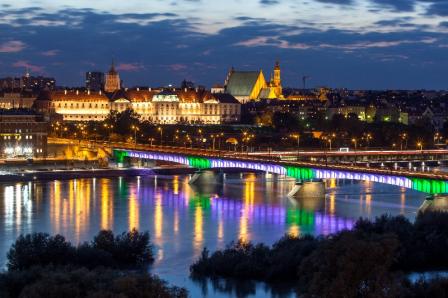Warsaw
Warsaw is a city of constant change. It’s not just its historic buildings, location, or importance in the region. Warsaw stands for its residents who want to participate in making decisions about their own city and to develop it. Warsaw is open, friendly, active, and diverse.
Warsaw is Poland’s capital city and its most important economic centre. It has a population of nearly 1.8 million and covers an area of 517 km2. It is composed of eighteen districts.
Along with its neighbouring municipalities, it forms the Warsaw Metropolis, which is one of Europe’s most rapidly developing areas. It features seventy municipalities, over 6000 km2 of area and about 3.1 million residents.
Warsaw is an important academic and scientific hub. Some of the country’s best universities, attracting students not just from Europe, are based here. The city occupies a prominent position among developing technological hubs. Its creative sector is on the rise, making Warsaw even more attractive to talented creators and artists.
Warsaw has a lot of green areas to offer and an incredibly well-developed public transport network. Green areas and forests cover more than 26% of the city's total area. A unique natural asset are the Vistula’s wild river banks. The city has a rich and varied cuisine and an incredible restaurant base. It ranks among the top vegan-friendly cities.
Warsaw’s local government actively works to make the city inclusive to all. Everyone feels at home here, wherever they come from, whatever their religion or lifestyle might be. Warsaw is also a city developing in a dialogue with its residents, supporting NGOs and civil society.
In 2019 Warsaw was chosen the most disabled-friendly city in a competition organised by the European Commission.


